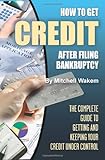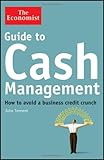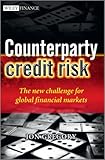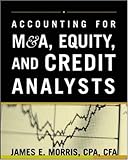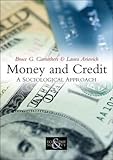How to Get Credit After Filing Bankruptcy: The Complete Guide to Getting and Keeping Your Credit Under Control
How to Get Credit After Filing Bankruptcy: The Complete Guide to Getting and Keeping Your Credit Under Control
According to the United States Bankruptcy Courts, the number of bankruptcies filed each year is on the rise. People file bankruptcy for a variety of reasons, such as preventing foreclosure on their homes, preventing repossession of property, loss of employment, or reducing or eliminating debts. The most common types of bankruptcy for which individuals file are Chapter 7 and Chapter 13. Chapter 7 involves the surrender of property to pay debts, while a Chapter 13 bankruptcy allows for the retention of property but requires payments over the next three to five years. A person who finds himself or herself in this undesirable situation may wonder how they are ever going to repair their credit. How to Get Credit after Filing Bankruptcy: The Complete Guide to Getting and Keeping Your Credit under Control provides the answers in a clear-cut, easy-to-read manner. The author tells you how to take charge of your credit so you can apply for loans and mortgages and obtain low interest rates. In addition, you will learn how to order a copy of your credit report, how to check your credit report for accuracy, how to read it, how to avoid discrimination and credit repair scams, how to apply for an unsecured credit card, how to report your good work to bureaus if creditors do not, how to maintain good relationships with your bank and creditors, how to consolidate all your debt, how to lessen your reliance on credit cards, and how to decide if lawyer-assisted credit repair is right for you. You will also learn simple strategies for making payments on time and for rebuilding your credit. Whether you have just declared bankruptcy or you have been living with the stigma for years, this new book will provide you with all the information you need to take a step in the right direction.
List Price: $ 24.95
Price:
Guide to Cash Management: How to Avoid a Business Credit Crunch (The Economist)
Guide to Cash Management: How to Avoid a Business Credit Crunch (The Economist)
Effective cash management advice to help boost profitability and fend off risk
Cash, not profit, has always been the ultimate determinant of whether a business survives, and the current credit crunch has highlighted to businesses the importance of cash management. Firms that ran short on cash discovered this firsthand during the financial crisis, running into serious financial trouble or even going bust. Guide to Cash Management: How to Avoid a Business Credit Crunchis the invaluable guide for any business that wants to avoid running into its own credit crunch and stay fiscally sound.
Written in a concise yet accessible manner, the book clearly explains the six critical aspects of the effective management of cash and cash flow, including:
- Forecasting likely cash receipts and payments
- Establishing funding lines necessary to cover asset purchases or for working capital
- Efficiently managing day-to-day operations with regard to the amount of cash required
- Selecting appropriate investment opportunities that result in positive cash flow
- Monitoring the profitability of products and services to ensure they are cash generative and not cash destroying
- Having a plan for managing excess cash that exceeds demand
Essential reading for intelligent business professionals and investors, Guide to Cash Management is designed to help firms improve their profitability and reduce risks.
List Price: $ 34.95
Price:
Categories: Loan Products Tags: Avoid, Business, cash, Credit, Crunch..., Economist, Guide, Management
Where can a person with bad credit get a relatively small loan?
Question by Neal R: Where can a person with bad credit get a relatively small loan?
I had to take out a couple of payday loans for an emergency and now they are drowning me. If I could get an installment loan for $ 1500 or so I could get back on track. Does anyone have any ideas?
Best answer:
Answer by SDD
You can try one of the peer-to-peer lending groups like Prosper. Without knowing anything else, I can’t say what the odds are, but it wouldn’t hurt to try.
Know better? Leave your own answer in the comments!
Categories: Loan Questions Tags: Credit, loan, person, relatively, Small
Q&A: How do I get out of my 20% APR? Where can I refinance my vehicle with poor credit?
Question by Kelle: How do I get out of my 20% APR? Where can I refinance my vehicle with poor credit?
My boyfriend was forced to use Drive Time because of his poor credit, he is now stuck in a 20% APR, paying $ 200.00 every 2 weeks. On a 2003, bottom of the line F150. We are desperately searching for what measures we can take to get him refinanced? His bank has already turned him down, and Drive Time will not work with him. Is a self reposession our only option?
Best answer:
Answer by erin o
If he still has poor credit then it’s doubtful that you’ll find anyone willing to give you a loan with a lower interest rate. You can sell the car and buy one that it much cheaper.
Know better? Leave your own answer in the comments!
Categories: Loan Questions Tags: Credit, poor, Refinance, vehicle
Counterparty Credit Risk: The new challenge for global financial markets (The Wiley Finance Series)
Counterparty Credit Risk: The new challenge for global financial markets (The Wiley Finance Series)
The first decade of the 21st Century has been disastrous for financial institutions, derivatives and risk management. Counterparty credit risk has become the key element of financial risk management, highlighted by the bankruptcy of the investment bank Lehman Brothers and failure of other high profile institutions such as Bear Sterns, AIG, Fannie Mae and Freddie Mac. The sudden realisation of extensive counterparty risks has severely compromised the health of global financial markets. Counterparty risk is now a key problem for all financial institutions.
This book explains the emergence of counterparty risk during the recent credit crisis. The quantification of firm-wide credit exposure for trading desks and businesses is discussed alongside risk mitigation methods such as netting and collateral management (margining). Banks and other financial institutions have been recently developing their capabilities for pricing counterparty risk and these elements are considered in detail via a characterisation of credit value adjustment (CVA). The implications of an institution valuing their own default via debt value adjustment (DVA) are also considered at length. Hedging aspects, together with the associated instruments such as credit defaults swaps (CDSs) and contingent CDS (CCDS) are described in full.
A key feature of the credit crisis has been the realisation of wrong-way risks illustrated by the failure of monoline insurance companies. Wrong-way counterparty risks are addressed in detail in relation to interest rate, foreign exchange, commodity and, in particular, credit derivative products. Portfolio counterparty risk is covered, together with the regulatory aspects as defined by the Basel II capital requirements. The management of counterparty risk within an institution is also discussed in detail. Finally, the design and benefits of central clearing, a recent development to attempt to control the rapid growth of counterparty risk, is considered.
This book is unique in being practically focused but also covering the more technical aspects. It is an invaluable complete reference guide for any market practitioner with any responsibility or interest within the area of counterparty credit risk.
List Price: $ 99.00
Price:
Is it better for your credit to have several credit cards with moderate limit, or one card with a high limit?
Question by shooter 1: Is it better for your credit to have several credit cards with moderate limit, or one card with a high limit?
I have zero debt. I also have several credit cards. I am wondering how it will affect my credit to request the highest limit for each card, or if I should cancel all but 2 and have those with high spending limits. Along the same lines, how does “available” credit affect one’s credit score negatively or positively? If I get a $ 50,000 limit on a card (with 0 balance) but say, go to buy a car, will I be denied because I have too much credit out there?
Best answer:
Answer by talr
It’s better for your credit to have several cards with modern limit, as the FICO formula used by the credit bureaus consider the number of credit lines in good credit (by their type, e.g. revolving credit, installment loans etc). A lower number of credit lines will result in a lower score (since you’ll have more limited history).
Obviously that assume all of them are in good standing – if they’re not, the picture changes dramatically.
As to the total credit, what they look at is which percenage of your total credit are you using, and for that it’s irrelevant how it’s distributed between the credit lines.
Know better? Leave your own answer in the comments!
Accounting for M&A, Equity, and Credit Analysts
Accounting for M&A, Equity, and Credit Analysts
As each new accounting question or scandal hits Wall Street, investment professionals too often find themselves asking, “What happened?” Accounting for M&A, Equity, and Credit Analysts answers the most common accounting questions, all in an easy-to-follow format designed to provide investment professionals with real-world, hands-on knowledge of key accounting treatments, models, and practices. Written by well-known M&A expert James E. Morris, this versatile accounting desk reference bridges the gap between what is taught in business school and what is needed in the real world.
List Price: $ 59.95
Price:
Categories: Loan Products Tags: Accounting, Analysts, Credit, equity
Q&A: I have bad credit and am looking for an installment loan to pay off payday loans?
Question by : I have bad credit and am looking for an installment loan to pay off payday loans?
I need Canadian companies only, preferably Ontario
Best answer:
Answer by My Take on It
You are not going to get an installment loan to pay off payday loans if you have bad credit.
In fact, you had to get payday loans because that was the only type of loan you could get due to your credit then..and now you cannot even pay the payday loans, and your credit is still bad. If you couldn’t get a *normal* loan back then, you sure won’t be getting one now.
Give your answer to this question below!
Categories: Loan Questions Tags: Credit, Installment, loan, loans, looking, Payday
Money and Credit: A Sociological Approach (PESS – Polity Economy and Society Series)
Money and Credit: A Sociological Approach (PESS – Polity Economy and Society Series)
This book offers a fresh and uniquely sociological perspective on money and credit. As basic economic institutions, money and credit are easy to overlook when they work well. When they malfunction, as they did in the new millennium’s global financial crisis, their importance becomes obvious and demands further investigation.
Bruce Carruthers and Laura Ariovich examine the social dimensions of money and credit at both the individual and corporate levels, from the development of personal credit and a consumer society, to the role of government in the creation of money. In clear prose, they illustrate how the overall future of the economy is governed by the financial system and the flow of capital into, and out of, firms operating in particular industrial sectors, as well as the social meanings money itself acquires and the ways people distinguish between “dirty” and “clean” money.
This accessible and engaging book will be essential reading for upper-level students of economic sociology, and those interested in how the bills, coins and plastic in our pockets shape the world we live in.
List Price: $ 24.95
Price:
Categories: Loan Products Tags: Approach, Credit, Economy, money, PESS, Polity, series, Society, Sociological


